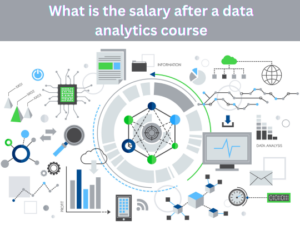Data analytics is a fast-expanding industry that offers students and professionals attractive career options. MBA graduates, like all other grads, are favored over other graduates. There are numerous questions regarding employer preferences, the value of an MBA degree, and employment opportunities for data analysts and MBA grads. However, many students and working professionals still need to decide whether they need an MBA to become data analysts.
This article will look at whether anyone can become a data analyst without an MBA and offer advice on how to get started or restart a career in this profession.
Importance of an MBA Degree
Students interested in a business profile usually enroll in an MBA program, a postgraduate degree focusing on business administration and management.
An MBA is typically accepted as a prerequisite for business professionals. An MBA is required in many fields but not necessarily for a career in data analysis; nevertheless, let’s delve into the details of this program.
It provides students with a broad understanding of many aspects of company operations and personal development:
- finance
- marketing
- accounting
- management
- better communication skills
- leadership
- critical thinking abilities
It is advised that students with an MBA degree pursue leadership responsibilities in their jobs in any field.
Furthermore, an MBA can assist students in developing crucial networking connections, which can assist them in finding job opportunities and advancing their careers in whichever field they want.
Wish to pursue a career in data analytics? Enroll in these Best Data Analytics Courses to start your journey.
When it comes to data analytics, an MBA may be unnecessary. While an MBA degree can provide a good foundation in business operations, data analysis requires more technical abilities.
In contrast, a statistics, computer science, or mathematics degree is more applicable to a data analyst position. Furthermore, an MBA program can be time and money expensive; determining if the investment is lucrative is critical.
Employer Preferences
Employers often want candidates that have the following characteristics:
- A solid grasp of data analytics ideas and tools
- A blend of scientific and business knowledge
- Programming languages such as Python, R, and SQL are examples of technical talents.
- Knowledge of data visualization technologies such as Tableau and PowerBI
- Understanding and analyzing business problems and generating recommendations based on data insights are examples of business acumen.
Some businesses consider an MBA degree optional, while others demand it. Companies value technological abilities and experience over academic credentials. While an MBA might help with business understanding, it is only sometimes required for a career in data analysis.
A data analyst must have a bachelor’s degree in computer science or statistics and a solid understanding of data analysis tools and procedures.
However, having an MBA might provide you with an advantage in a competitive job market, especially for leadership jobs.
An MBA degree can also lead to marketing, finance, and operations jobs. In addition, you can improve your own skills by following these tips:
Improve your technical abilities: Data analysis necessitates knowledge of computer languages like Python or R, as well as experience with data visualization tools like Tableau or PowerBI. Develop your talents in these areas by taking courses or using online tutorials.
Create a portfolio: Create a portfolio of data analysis projects demonstrating your talents and experience since this can help you showcase your work to potential employers.
Keep abreast with industry developments: To stay updated on the newest trends and best practices in data analysis, read industry blogs and attend conferences or webinars.
Cooperate with others: Collaborate with other data analysts or business stakeholders to understand business problems and develop data-driven solutions.
Excellent knowledge of statistics, data visualization, and data modeling approaches.
It is vital to be able to communicate insights successfully to non-technical stakeholders.
Pursuing a data science or analytics degree is one approach to getting applicable skills and expertise. In these subjects, many universities offer undergraduate and graduate programs.
Participating in internships or freelance jobs is another option to get experience. These changes can give you hands-on exposure to real-world data sets and tools.
Learn the core concepts of Data Analytics Course video on Youtube:
Career Options for MBA Graduates
While an MBA can benefit a career in data analysis, persons with an MBA degree have many other choices. For example, an MBA in marketing can provide a firm foundation in marketing principles and procedures. Jobs in marketing include brand management, advertising, and market research. An MBA degree in finance can also equip graduates for positions in finance such as investment banking, corporate finance, or financial analysis. MBA graduates with an emphasis on operations can also seek careers in supply chain management, logistics, and process improvement.
Among the most popular professional pathways are:
Management consulting: Because of their business acumen and problem-solving abilities, consulting firms frequently seek MBA graduates.
Investment banking: MBA graduates with financial and analytical skills might work in investment banking to assist companies in obtaining funds or making strategic investments.
Entrepreneurship: MBA graduates can launch their firms, leveraging their business administration and management understanding to create profitable initiatives.
Career Options for Data Scientists
Data scientists have a fast-expanding job market with many opportunities across industries. The following are some of the most prominent career pathways for data scientists:
Business Intelligence: By analyzing and understanding complicated data sets, data analysts that specialize in business intelligence can assist organizations in making data-driven decisions.
Large amounts of data are collected on a daily basis, a lot of infrastructure is required to be created and maintained, and hence, Data Engineers are required.
Data Scientists employ statistical analysis and machine learning techniques to create predictive models and insights to help businesses make decisions.
Pursue a career in Data Analytics with the number one training institute 360DigiTMG. Enroll in the best Data Analyst Course Institute in Pune to start your journey.
Data Science Placement Success Story
Conclusion
An MBA is only sometimes required to work as a data analyst. While an MBA can provide a solid basis for business operations, it may need more specific technical abilities required for data analysis. Employers value technical skills and expertise over academic credentials.
To be a competent data analyst, you must first master statistics, data visualization, data modeling techniques, and technical programming knowledge.
Pursuing a degree in data science or analytics, working on internships or freelance projects, and constantly developing one’s abilities through courses and certifications can help one become a successful data scientist.
Marketing, finance, and operations are all viable options for MBA grads. Career choices for data scientists include business intelligence, data engineering, and data science. Finally, whether or not to obtain an MBA depends on one’s career goals and interests.
Browse Other Courses
- Artificial Intelligence Course in Pune
- Business Analytics Course in Pune
- Cloud Computing Course in pune
- Cyber Security Course in Pune
- Data Analytics Course in Pune
- Digital Marketing Course in pune
- Ethical Hacking Course in Pune
- IoT Certification Course Training in Pune
- Machine Learning Course in Pune
- PMP® Certificate Course in Pune
- Python Course in Pune
- Tableau Course in Pune
Navigate to Address:
360DigiTMG – Data Analytics, Data Science Course Training in Pune
No. 408, 4th Floor Saarrthi Success Square, near Maharshi Karve Statue, opp. Hotel Sheetal, Kothrud, Pune, Maharashtra 411038
089995 92875
Get Directions: Best Data Analytics Courses




